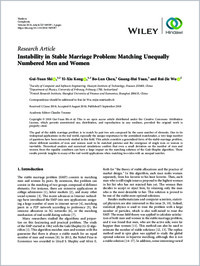Instability in stable marriage problem: matching unequally numbered men and women
- Shi, Gui-Yuan Faculty of Computer and Software Engineering, Huaiyin Institute of Technology, Huaian, China - Department of Physics, University of Fribourg, Switzerland
- Kong, Yi-Xiu Faculty of Computer and Software Engineering, Huaiyin Institute of Technology, Huaian, China - Department of Physics, University of Fribourg, Switzerland
- Chen, Bo-Lun Faculty of Computer and Software Engineering, Huaiyin Institute of Technology, Huaian, China
- Yuan, Guang-Hui Fintech Research Institute, Shanghai University of Finance and Economics, Shanghai, China
- Wu, Rui-Jie Department of Physics, University of Fribourg, Switzerland
-
2018
Published in:
- Complexity. - 2018, vol. 2018, p. 7409397
English
The goal of the stable marriage problem is to match by pair two sets composed by the same number of elements. Due to its widespread applications in the real world, especially the unique importance to the centralized matchmaker, a very large number of questions have been extensively studied in this field. This article considers a generalized form of the stable marriage problem, where different numbers of men and women need to be matched pairwise and the emergence of single men or women is inevitable. Theoretical analysis and numerical simulations confirm that even a small deviation on the number of men and women from the equality condition can have a large impact on the matching solution of the Gale-Shapley algorithm. These results provide insights to many of the real-world applications when matching two sides with an unequal number.
- Faculty
- Faculté des sciences et de médecine
- Department
- Département de Physique
- Language
-
- English
- Classification
- Physics
- License
-
License undefined
- Identifiers
-
- RERO DOC 323476
- DOI 10.1155/2018/7409397
- Persistent URL
- https://folia.unifr.ch/unifr/documents/307496
Statistics
Document views: 174
File downloads:
- pdf: 164
